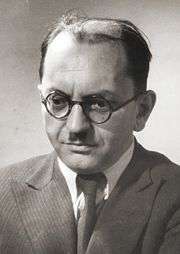Adam Ciołkosz
Adam Ciołkosz (pronounced [ˈadam ˈt͡ɕɔwkɔʂ]; January 5, 1901 – October 1, 1978) was a Polish scout, soldier, publicist and politician, who was one of the most important leaders of the Polish Socialist Party, both in the Second Polish Republic and in exile during and after World War II.[1]
Adam Ciołkosz | |
|---|---|
 | |
| Born | January 5, 1902 |
| Died | October 1, 1978 |
| Nationality | Polish |
| Occupation | Politician |
| Known for | Leaders of Polish Socialist Party |
Early life and education
Ciołkosz was born in Kraków, but a year later his family moved to Tarnów. His father, Kasper, was an active progressive and independence agitator. His mother, Maria Idzikowska, was the daughter of a veteran of the January Uprising. He graduated from a Gymnasium in Tarnów and later studied law at the Jagiellonian University. While a student, Ciołkosz became a member of the socialists movement.
Scouting and fighting for independence
In Gymnasium, Ciołkosz joined 1st Scouts Squad, "Zawisza Czarny". Later, he was a founder and organizer of scouting in Zakopane. During World War I, he lived in Vienna and still was active. In October 1918, he and National Emergency Squads of the Polish Scouts, which he had formed and led with POWs, forced Austrian forces to surrender in Tarnów. In November, he was one of the young scouts who participated in battle for Lwów. In 1919, Ciołkosz was promoted to a junior lieutenant. He was also an organizer of Polish scouting movement in Warmia and Mazury and fought during Silesian Uprising.
Political career
In 1928, he was elected a Sejm Member from the Polish Socialist Party. He was re-elected in 1930, but this time Sanacja authorities didn't allowed him to take office as with many others of the opposition.
He was one of the most outspoken critics of the Sanacja regime and was tried and sentenced to three years in prison during Brest trials in 1931 for plotting anti-government coup.[1] After the German invasion into Poland in 1939, Ciołkosz, his wife Lidia Kahan was of Jewish descent (also a prominent socialist from UJ),[2] and son Andrzej Ciołkosz fled first to Romania, and later France and England. His son died at the age of 23 in 1952, having translated Herling a year earlier.[3]
Ciołkosz was an active politician in exile and soon was elected party leader. He led PPS in exile until his death in London. A strong anti-Stalinist, he opposed Soviet domination in the Eastern Europe after 1945. His wife died in 2002 at age of 99.[1]
References
- Jarosław Tomasiewicz, "Na posterunku. Życiorys niepodległościowego socjalisty" – prezentacja życia i poglądów Adama Ciołkosza (biography), Lewicowo.pl (Internet Archive) (in Polish)
- Jacek Kowalski (11 June 2002). "Adam i Lidia Ciołkoszowie". Encyklopedia Emigracji. Retrieved 31 October 2014.
- Author profile (2014). "Andrzej Ciolkosz (Translator)". A World Apart: Imprisonment in a Soviet Labor Camp During World War II. Goodreads Inc. Retrieved 1 November 2014.